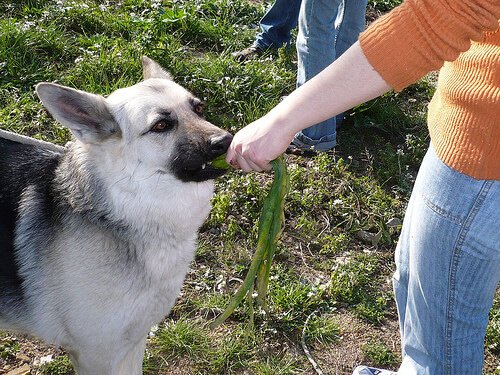Broccoli in a Dog's Diet

All animals lovers want to give their pets the best of everything, and often they don’t know what they can and cannot eat. So, it’s important to understand that there are “human” foods that animals are allowed to eat, such as broccoli. Keep reading to find out how to add it to your dog’s diet in order to keep him healthy.
Broccoli – yes or no in a dog’s diet?

Currently, there is an invasion of “trashy” food that your pet somehow ends up eating. Without your dog becoming a vegetarian, you can choose certain and even more natural options for their diet. Remember, not all vegetables are healthy for animals even if they are good for people.
As for broccoli, it is nutritious and suitable for everyone at home (even your pet). You can add this vegetable to your pet’s food or even use as a treat. It provides many vitamins (A, C, and K), fiber and manganese.
It is important to cook the broccoli before giving it to your dog. You can either steam or boil it. Keep in mind that even if broccoli is very nutricious, you can’t give too much to your dog, because an excessive amount can cause gas or stomach pain.
The good news is that broccoli as well as other members of the “cruciferous” vegetable family (Brussel sprouts, cabbage, or collard greens) contain phytochemicals capable of preventing certain medical conditions in pets.
It has been proven that these greens are anticarcinogenic and anti-aging. It is a good idea to add them in small amounts to your dog’s diet to improve the health of the stomach and bladder.
What other vegetables can I give to my dog?
Veterinarians are usually asked this question daily. This is because more and more pet owners want their four-legged friends to eat healthier. You should keep in mind that there are certain vegetables allowed and others forbidden for dogs. Besides broccoli, other suitable vegetables include:
1. Carrots
You can give him chopped or shredded carrots mixed in with his dog food, or raw strips as a reward. Carrots have a good dose of vitamin A, antioxidants, and carotenes. All these nutrients keep your pet healthy and protected from diseases. Some theories claim that this vegetable can improve dogs’ vision. It’s a healthy substitute for store-bought cookies or snacks that you give as rewards.

2. Asparagus
Asparagus is a huge source of vitamin A, B1, B2, C, E, and K, as well as folic acid, fiber, iron, manganese, and potassium. You can boil it and cut it into pieces to later mix them with the usual food. Or you could grill it and give it as a reward.
3. Cucumber
Dogs can indeed eat cucumber, and many of them love it. Cut the cucumber into small slices or cubes; drain it well so that the bitterness goes away. They have a lot of benefits for dogs. For example, they improve intestinal health, provide vitamin B and C, and reduce blood pressure due to their potassium content.
4. Spinach
Nutritionally speaking, this very important vegetable is beneficial for your dog. Rich in iron, calcium, and beta-carotene, spinach can be boiled or steamed, chopped into pieces, and added to dog food. It’s perfect for puppies since it promotes bone health and growth.
5. Pumpkin
This orange vegetable has many nutrients, especially carotene. If your pet suffers from constipation, we recommend that you add pumpkin to his usual diet. It’s only a matter of boiling it or cooking it in the oven and then giving it to him as a purée or in pieces.
6. Celery
Thinly-sliced celery sticks added to your dog’s diet can help him if he suffers from bone problems, arthritis, or osteoarthritis (especially in older dogs). This vegetables provides potassium and fiber, and it’s an excellent diuretic that promotes urinary and renal health.
All animals lovers want to give their pets the best of everything, and often they don’t know what they can and cannot eat. So, it’s important to understand that there are “human” foods that animals are allowed to eat, such as broccoli. Keep reading to find out how to add it to your dog’s diet in order to keep him healthy.
Broccoli – yes or no in a dog’s diet?

Currently, there is an invasion of “trashy” food that your pet somehow ends up eating. Without your dog becoming a vegetarian, you can choose certain and even more natural options for their diet. Remember, not all vegetables are healthy for animals even if they are good for people.
As for broccoli, it is nutritious and suitable for everyone at home (even your pet). You can add this vegetable to your pet’s food or even use as a treat. It provides many vitamins (A, C, and K), fiber and manganese.
It is important to cook the broccoli before giving it to your dog. You can either steam or boil it. Keep in mind that even if broccoli is very nutricious, you can’t give too much to your dog, because an excessive amount can cause gas or stomach pain.
The good news is that broccoli as well as other members of the “cruciferous” vegetable family (Brussel sprouts, cabbage, or collard greens) contain phytochemicals capable of preventing certain medical conditions in pets.
It has been proven that these greens are anticarcinogenic and anti-aging. It is a good idea to add them in small amounts to your dog’s diet to improve the health of the stomach and bladder.
What other vegetables can I give to my dog?
Veterinarians are usually asked this question daily. This is because more and more pet owners want their four-legged friends to eat healthier. You should keep in mind that there are certain vegetables allowed and others forbidden for dogs. Besides broccoli, other suitable vegetables include:
1. Carrots
You can give him chopped or shredded carrots mixed in with his dog food, or raw strips as a reward. Carrots have a good dose of vitamin A, antioxidants, and carotenes. All these nutrients keep your pet healthy and protected from diseases. Some theories claim that this vegetable can improve dogs’ vision. It’s a healthy substitute for store-bought cookies or snacks that you give as rewards.

2. Asparagus
Asparagus is a huge source of vitamin A, B1, B2, C, E, and K, as well as folic acid, fiber, iron, manganese, and potassium. You can boil it and cut it into pieces to later mix them with the usual food. Or you could grill it and give it as a reward.
3. Cucumber
Dogs can indeed eat cucumber, and many of them love it. Cut the cucumber into small slices or cubes; drain it well so that the bitterness goes away. They have a lot of benefits for dogs. For example, they improve intestinal health, provide vitamin B and C, and reduce blood pressure due to their potassium content.
4. Spinach
Nutritionally speaking, this very important vegetable is beneficial for your dog. Rich in iron, calcium, and beta-carotene, spinach can be boiled or steamed, chopped into pieces, and added to dog food. It’s perfect for puppies since it promotes bone health and growth.
5. Pumpkin
This orange vegetable has many nutrients, especially carotene. If your pet suffers from constipation, we recommend that you add pumpkin to his usual diet. It’s only a matter of boiling it or cooking it in the oven and then giving it to him as a purée or in pieces.
6. Celery
Thinly-sliced celery sticks added to your dog’s diet can help him if he suffers from bone problems, arthritis, or osteoarthritis (especially in older dogs). This vegetables provides potassium and fiber, and it’s an excellent diuretic that promotes urinary and renal health.
This text is provided for informational purposes only and does not replace consultation with a professional. If in doubt, consult your specialist.








